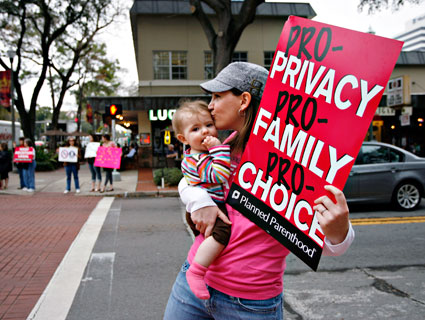Last month, after the GOP’s push to defund Planned Parenthood fizzled in Congress, Indiana became the first state to go after the organization on its own. The Republican-run legislature in the Hoosier State passed a bill barring Planned Parenthood from receiving Medicaid funds, and social conservatives cheered when GOP Gov. Mitch Daniels, who once spoke of the need for a social issues “truce,” signed the bill into law.
On Wednesday, the Obama administration fired back, and said no dice. Donald Berwick, the controversial head of the Centers for Medicare and Medicaid Services, sent a letter to Indiana officials informing them that their new law illegally discriminates among health care providers. That’s bad news for Indiana. States that don’t follow the federal government’s rules for distributing Medicaid money—including those that apply to family planning dollars—can in theory be stripped of all federal Medicaid funding. If that happened, slashing a few million dollars of family planning money for Planned Parenthood would end up costing Indiana billions.
Planned Parenthood is already challenging the defunding law in court, but the Obama administration move ups the ante by getting the executive branch directly involved. The letter also serves as a warning to any states that are considering following Indiana’s lead: killing off Planned Parenthood won’t be quite as easy as Daniels and state GOP leaders may have hoped. Berwick, who was given his job via a recess appointment, won’t become any more popular with conservatives, who have dubbed him “Dr. Death” thanks to fears that he will impose health care rationing and death panels. But at least Democrats and pro-choice activists should be happy to see the Obama administration making a strong move to protect abortion services.
Meanwhile, since Indiana passed the new Medicaid law, private donors have filled Planned Parenthood’s coffers with more than $100,000 in a strong show of support for the group. The donations aren’t nearly enough to make up for the $2 million in Medicaid funds that Planned Parenthood’s Indiana operation will lose if the defunding law survives, but they will keep services in the state up and running at least for another two weeks.











